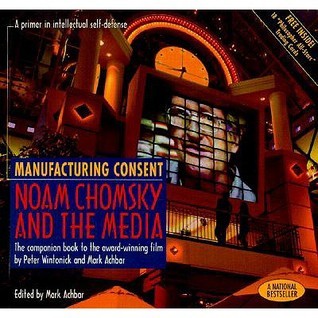
Manufacturing Consent: Noam Chomsky and the Media
Book Description
What if the news you trusted was a carefully crafted illusion? In "Manufacturing Consent: Noam Chomsky and the Media," Mark Achbar unveils the hidden machinery behind media manipulation. Through sharp analysis and compelling visuals, the documentary dives deep into how powerful interests shape public perception and control the narrative. The chilling interplay of propaganda and democracy fuels an urgent exploration of free speech and the role of dissent in society. As the lines between truth and deception blur, one question looms: are we truly informed or merely consented?
Quick Book Summary
"Manufacturing Consent: Noam Chomsky and the Media" is a compelling exploration of how modern mass media serves not as an impartial conduit of information, but as an instrument of persuasion and control. Through interviews, archival footage, and analytical graphics, Mark Achbar unpacks Chomsky and Herman's "propaganda model," which suggests that media outlets systematically favor powerful corporate and political interests. The documentary uncovers how news organizations filter stories, set agendas, and marginalize dissenting voices, raising critical questions about democracy, free speech, and the informed consent of the governed. By examining major media coverage of foreign interventions, labor strikes, and controversial policies, the film points to alarming patterns of manipulation. "Manufacturing Consent" ultimately challenges viewers to reflect on the role of media in shaping collective reality and the necessity of skepticism and civic engagement.
Summary of Key Ideas
Table of Contents
The Propaganda Model and Media Filters
At the heart of "Manufacturing Consent" is the "propaganda model" developed by Noam Chomsky and Edward S. Herman. This model argues that mass media in democratic societies serve elite interests through structural mechanisms such as ownership, funding sources (primarily advertising), sourcing of information, flak, and ideological framing (such as anti-communism). The film demonstrates how these filters shape the manufacturing of public consent for policies that favor those in power. By tracing economic and institutional dependencies, viewers gain insight into the largely unseen forces governing the news agenda.
Corporate and Political Influence on News
The documentary delves into how corporate ownership and advertising exert powerful control over what stories are covered and how they are presented. Media conglomerates, beholden to parent companies and major ad clients, tend to avoid topics that threaten commercial interests or challenge the status quo. Political influence, both overt and covert, further molds reporting and limits the spectrum of debate. Through interviews with Chomsky and real-world examples, Achbar illustrates that supposed journalistic independence is frequently compromised by financial and political pressures.
Marginalization of Dissent
A major theme in the film is the systematic marginalization of dissenting perspectives. Alternative viewpoints—whether from whistleblowers, activists, or outsider intellectuals—are often ignored, ridiculed, or minimized within mainstream media. The documentary reveals that this narrowing of debate undermines popular understanding of critical issues, sustaining the illusion of broad consensus where none may exist. The exclusion of dissent is portrayed as a danger to robust democratic discourse and the vital role of skepticism in a free society.
Selective Coverage and Agenda Setting
Selective coverage and agenda setting play a central role in shaping public perceptions. The film contrasts in-depth reporting on crimes or abuses committed by official enemies with the muted or absent coverage of similar acts by allied states. Achbar employs striking examples—from foreign policy interventions to domestic labor disputes—to expose how media narratives can manipulate context and emphasis. This selection bias, the film demonstrates, is foundational to controlling the limits of acceptable opinion and maintaining existing power structures.
Implications for Democracy and Free Speech
In its final analysis, "Manufacturing Consent" invites viewers to question the very nature of democracy when the information ecosystem is shaped by elite interests. The documentary underscores the essential function of critical media literacy and engaged citizenship. Chomsky advocates for broader access to alternative information sources and the democratization of media, as well as the ongoing necessity of dissent in preserving free speech. The film leaves audiences with a challenge: to look beyond manufactured narratives and actively participate in the pursuit of truth and accountability.
Download This Summary
Get a free PDF of this summary instantly — no email required.





